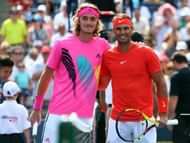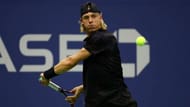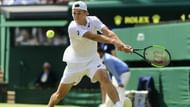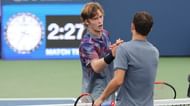The last Grand Slam tournament of the year always proves an exciting time for tennis fans, as the whole circus moves to Queens, New York. Nearly eight months into the season and the players are now feeling the effects of the punishing and rigorous tennis calendar.
The US Open, nevertheless, has been a competition with a magnificent history and a genuinely vibrant energy and has been the scene of many iconic moments in tennis history. The hard courts of Flushing Meadows remains the place where Rafael Nadal completed the elusive career Grand Slam in 2010 and where Pete Sampras burst onto the scene as a supremely talented 19-year old back in 1990. British hopes and dreams were also realized in New York when Andy Murray became the first Brit to win a Grand Slam in 76 years, as he defeated the reigning champion Novak Djokovic in five sets.
Men's tennis' has been dominated by a select group for more than a decade now. There are, however, a group of rising stars who are poised and ready for their moment in the limelight. Alexander Zverev's second victory in Washington and Stefanos Tsitsipas' run to the Roger's Cup final, both show that the next generation are drawing closer.to the current crop of players. Could this year's US Open be the tournament where the young guns make an indelible mark on tennis history?
Stefanos Tsitsipas

The 20- year-old Greek star first came to the attention of the masses when he made the final of the Barcelona Open, where he eventually lost to Rafael Nadal 6-1 6-2. On his way to the final, he defeated several top players including Dominic Thiem, Pablo Carreno Busta, and Diego Schwartzman, all of whom are very capable on the red dirt.
Tsitsipas made a similarly impressive impact at the Rogers Cup in Toronto, where he conquered the challenges of Alexander Zverev, Kevin Anderson, Dominic Thiem and Novak Djokovic before succumbing to Rafa once more. All of the names mentioned are in the top 10 and four of those mentioned have made the final of a Grand Slam. Reaching two finals on two different surfaces also indicates that he can adapt to the changes in the court speeds and way the ball bounces.
The 20-year old's main weapon is the forehand, which is both powerful and versatile, leaving opponents far behind the baseline or beyond the doubles lines. The youngster is very comfortable coming to the net and looks to seize on any opportunity to put the ball away from inside the court; an increasing rarity in the modern game where most only play from the baseline.
Denis Shapovalov

The 19-year-old Canadian first burst onto the scene when he won the 2016 Junior Wimbledon title, beating Alex de Minaur 4-6 6-1 6-3. The current world No.23, however, became widely known after his run to the semi-finals in Toronto last year, where he defeated Rafael Nadal in the quarterfinals and lost to the current world No.5, Alexander Zverev. The Canadian followed that up with a fourth-round finish at the US Open, which made him the youngest man to do so since Michael Chang back in 1989.
Shapovalov took his game to new heights this year when he reached the semi-finals of the Madrid Open, despite the fact the clay is his least favorite surface. Like Tsitsipas, Shapovalov has no fear of reputations or statuses, scoring wins against Milos Raonic, Kyle Edmund and Benoit Paire on his way to the penultimate round. During the 2017 US Open, he also defeated former Australian Open finalist Jo-Wilfred Tsonga in straight sets, completely overpowering the Frenchman.
Shapovalov and Tsitsipas have an entertainment factor and have exuberant styles of play, both of which will fare well during matches and also for tennis as a brand. Shapovalov's single-handed backhand allied with his extreme forehand make him appealing for every tennis fan.
Alex de Minaur

Alex de Minaur, over recent years, has started to establish himself as one of the game's up and coming talents. The 19 year old Australian, like his counterparts, had massive success at junior level, winning the Australian Open boys' doubles title in 2016. He also reached the final of boys' singles final at the All England Club, where he lost to Shapovalov.
The Australian currently works alongside Lleyton Hewitt and it is clear to see where Lleyton has influenced the 19-year-old's game. De Minaur's gritty baseline style of play contrasts massively with the all-court style adopted by Tsitsipas and Shapovalov. The Aussie's style very much embodies the modern baseline game used by the vast majority of players on the ATP and WTA tour.
Alex's best result at a major came at this year's Wimbledon, where he reached the third round, after defeating French Open semi-finalist Marco Cecchinato and France's Pierre Hugues-Herbert. Although he lost Rafael Nadal in straight sets and looked slightly overawed by the occasion, he put in an admirable effort and pushed Nadal to the best of his ability.
Alex de Minaur in many ways mirrors his coach Lleyton Hewitt. He may lack the firepower and the flair of his counterparts but has the heart of a warrior and a steely determination to win.
Andrey Rublev

The 20-year-old Russian continues to impress tennis across the world and on his day is a match for any player, with his hard-hitting and intense style of play. Like Shapovalov, Rublev had success as a junior, winning the French Open boys' title aged 16 in 2014. Unlike the other three youngsters, Rublev has an ATP title to his name, which came on the clay courts of Umag, Croatia last year.
Many will like Rublev because of his expressive and emotional style on the court; a characteristic that will definitely please some tennis fans. His hot-headed nature, however, can get the better of him, thus not allowing him to compose himself and get back to the task at hand.
The Russian's best performance at a major came at last year's US Open, where he reached the second week. His most notable victory came against former world No.3 Grigor Dimitrov, who too played some of his best ever tennis in 2017. He also defeated current world No.7 David Goffin, in the fourth round to progress to the quarter-finals and in doing so, became the youngest man to reach the quarters of the US Open, since Andy Roddick back in 2001.
